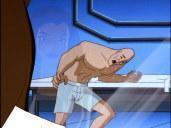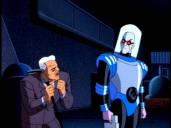Frostbite - Victor Fries' Eternal Conflict
by Alex Weitzman
 Our first glimpse of the prototypical good-man-gone-bad: Mr. Freeze. Heart of Ice. |
Indeed, moral fatigue is a good way of putting it, because it sounds infinitely accessible to any common audience member. And Victor is very much a common man. The various struggles of Victor Fries can be summed up as various permutations of interaction with the wrong kind of people. In almost every appearance of Mr. Freeze in the Timmiverse, something is askew in the man or woman just beside Victor. You can practically bounce from bad seed to bad seed. You start with Heart of Ice, in which the real interaction has occurred pre-episode, but is blatant throughout the entire story: Victor Fries regrets ever getting involved with Ferris Boyle. Boyle sets Victor up with a lab and funding, then comes to pull the plug at the most important moment. And THEN he leaves Victor for dead in an accident that he caused. Jerk. In fact, not to sound too conspiracy-theorist, but I'm even skeptical about Boyle's claim that he pulled funding weeks ago. Nothing else in the dialogue confirms that; Boyle seems very insistent on proving that he can do anything he wants, whenever he wants; and how the hell would Victor be getting anything he had at all if the funding was actually pulled? Who wants to bet that Boyle was blowing cheap hot air for his excuse as to why he was shutting Victor down? Again, jerk.
In SubZero, Victor again turns the wrong way to seek the right goal. Nora needs medical attention, but Victor, beginning to get more and more distrustful of the system, drafts his old colleague Gregory Belson for the cause. It is Belson that drives Victor to new lows of morality. Belson is a creep of a dickhead who finds lying casually as easy as lusting after gold. Perhaps you'd think that, by now, Freeze would know not to trust such people; after all, he proves he's learned something in Deep Freeze with his initial refusal of Walker's request. However, the spoiling element remains Nora. Victor Fries is driven by the same motive that has made him so desperately human in his previous appearances - the care for a loved one's welfare - but the stakes are simply being ratcheted higher and higher with each successive appearance. It is in SubZero when we first see Freeze outright lie, telling Koonak that he won't be harming Barbara Gordon. He's more vicious in SubZero, and less patient. SubZero is half-disliked by the main DCAU fandom (although not nearly as much as the next entry), because Freeze is beginning to lose our sympathy. He fails to target his poor influence, the way he targetted Boyle and Walker. He acts against someone whose sympathy with us is already established (Barbara Gordon, although admittedly, she sure does lose it in later stories). But again, this is because Nora's situation has been so multiplied in danger, and Victor is proving what depths he will sink to for her. It is a problem we see all the time in reality: when the chips are down, what lines will people cross?
While SubZero does take some flak, it's Cold Comfort that invokes the ire and hatred of the fanbase. In some respects, it's pretty easy to see why. It's a very drastic change from the Mr. Freeze modus operandi that we're used to; after all, Nora got cured in SubZero. No matter how it gussies it up, it does culminate in a dropping-a-bomb-on-the-city plotline, which might be the screenwriting equivalent of bringing up Hitler in an argument. Despite that, Cold Comfort does not come from a false premise, which in the span of the DCAU, is more important. The development at work is almost brilliant in its obviousness: due to Victor obsessing so much over the health of his wife Nora, he managed to completely miss the fact that he himself was suffering under a terrible physiological condition that could cause him serious harm - and that said harm (and his embarrassment at it) would result in him losing his wife after she gets better. It's traditionalism at its most intransigent and unhelpful to say that this concept is somehow "bad", because it's completely logical. Would Victor indeed react to this conclusion by partaking a crusade against that which we love? This one is harder to determine, as Freeze plays it as being the result of a emotional breakdown. When a soul is consumed by loss, especially a loss of something so coveted as Nora was to Victor, desperate actions are quite possible. The problem, ultimately with the episode, is that the writers had him engage in desperation that led to more boring consequences. This makes the episode less than worthy of the acclaim of the other sections of the Fries saga. However, fan complaints about the direction taken with Freeze itself is foolhardy, because this was a sadly inevitable direction for Victor Fries. You can only toe the darkness for so long, and obsession will result in terror at some point. The Batman world has shown us how normal people can become monsters, like Jervis Tetch and Harvey Dent. Victor Fries is in that group as well, but it took him a lot longer to get there. That he held it off for so long is admirable; that he fell was unfortunate but to be expected.
 New Gotham, new rules, same ol' ability of certain people to be incredible bastards. Meltdown. |
Victor, as a fan favorite, is preferred when we can like him, and even root for him. SubZero and Cold Comfort, therefore, are disliked because they make us uncomfortable. Since we can picture ourselves in Victor Fries' shoes in the really beloved episodes like Heart of Ice or Meltdown, those other ones reveal to us that we also have the capability to be on the other side of justice, to be improper in our actions. It's hard to tell an audience this. They don't like being told that they're evil, or even that they could be when the context calls for it. Still, in a certain way, that makes those two less-liked episodes actually more important than the other ones. Victor Fries is a common man with common needs, albeit at intense levels. It's the intensity that holds the potential for crossing the line, though, and it's dangerous to plug into Victor Fries' revenge fantasies for too long. This is why Batman is a necessary character. He keeps the story of Victor Fries from becoming a nihilistic matter of vengeance. Batman is there to curb Mr. Freeze when he goes too far, and will help him for the things he does that have no baser problems. Most of Batman's rogues need Batman to foil them. Mr. Freeze merely needs Batman to guide him.
